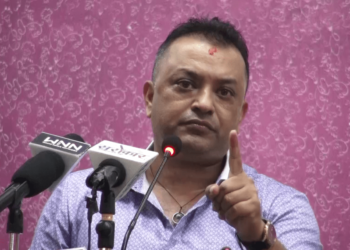The government’s new controversial bill on information technology has raised serious suspicion from different quarters. The new bill tabled today is passed by the House of Representatives (HoR) for discussion.
The bill shall replace two existing bills on information and technology. Many have viewed the bill as the government’s move towards authoritarianism by curtailing press freedom, the most important tenet of democracy.
However, defending the government’s move, Minister for Communication and Information Technology, Gokul Prasad Baskota said that the bill is not promoted by “vengeance against any individuals or parties” and that the motive of the bill remains to regulate the IT sector and to control cyber-crime.
International Federation of Journalists (IFJ) and its local affiliates have been repeatedly condemning the arrests of journalists on cyber-crime charges but Nepal police continue to arrest journalists on charges of cyber-crime charges.
However, media persons and human rights activists are least assured by the minister’s statement given the government’s record of attacks on the press and the freedom of speech.
Latest in the series is the government’s ban on Pashupati Sharma’s song titled, ‘Lutna sakay lut’ on YouTube. Famed folk singer was forced to withdraw his song from the YouTube that made a scathing attack on malpractices by those in power. While the government was not directly involved, it had used pro-government organizations to force Sharma into withdrawing the song.
The government had previously amended the Civil Code Act, Right to Privacy Bill and Criminal Code Act that is restrictive of rights being exercised by Nepali press.
The Federation of Nepali Journalists (FNJ)
On September 11, the Ministry of Communications and Information Technology formed a 15-member committee to review and recommend press friendly codes within 45 days following FNJ’s threat to launch a nationwide agitation against newly endorsed codes. Despite the government’s promises of not interfering with the press freedom, the right to a free press has been repeatedly compromised.
Communication and Information Minister Gokul Baskota who is also government’s main spokesperson forced to shut down the 12-year old popular state-run Nepal Television (NTV) program ‘Sidha Prashna’ (direct question) after the presenter grilled the minister on a TV show over his property details. In the final episode of the show, the minister was in an embarrassing state for his lies on property detail and got highly proved over the interview.
Nepal Police have been harassing and interrogating journalists over news stories. This has seriously undermined the constitution right of press freedoms posing grave risks to journalists in collecting investigative stories and critical news against the government and ruling party leaders.
“I am not quite sure whether the government is tightening the grip on the social media users or the particular social platforms,” said Prof. P Kharel, a senior journalist. “I have not gone through the content of the bill. However, it seems that the government is hell-bent on curtailing the right to freedom of expression. Since Nepal’s constitution guarantees the freedom of expression than any other developed countries, restriction on social media will be unfortunate,” he stated.
On September 10, Nepal Police arrested Raju Basnet, Editor-in-Chief of ‘Khojtalas’ weekly on alleged cybercrime charges over a piece of published news about the ruling communist government’s powerful lawmaker, Pampha Bhusal.
Communication and Information Minister Gokul Baskota who is also government’s main spokesperson forced to shut down the 12-year old popular state-run Nepal Television (NTV) program ‘Sidha Prashna’ (direct question) after the presenter grilled the minister on a TV show over his property details. In the final episode of the show, the minister was in an embarrassing state for his lies on property detail and got highly proved over the interview.
Such government acts have only heightened the fears of the journalists regarding their rights to a free press. There are concerns that online media can fall easy prey to government’s action on the pretext of cyber-crime.
International Federation of Journalists (IFJ) and its local affiliates have been repeatedly condemning the arrests of journalists on cyber-crime charges but Nepal police continue to arrest journalists on charges of cyber-crime charges.
However, Kundan Aryal, Press Advisor to the Prime Minister, defends the move saying that the government does not have any intent to control social media users. “This is to see that Facebook and Twitter are registered in Nepal,” he said adding that even companies like Facebook and Twitter are interested to register their companies in Nepal. According to him, one of the intentions is to control the anti-social activities on social media. “Be assured, freedom of expression will not be controlled,” he stated.
Police administration has been overriding the jurisdiction of the Press Council of Nepal entrusted to see any complaints regarding the news related matters. However, Nepal Police have lost all court cases on cyber-crime charges against journalist as of yet. Nevertheless, its arbitrary arrests and intimidation of online journalist continue.
“The proposed new bill twists even the existing previous rights of the free press. The new provisions are regressive to Nepal’s democracy and if we fail to ensure press freedom at this moment it will eventually result in the demise the Nepali free press,” expressed Shiva Gaunle, Editor of the Centre for Investigative Journalism adding, “I don’t think they will register their companies in Nepal.”
In the last week of August police arrested Homnath Sigdel, 44, for posting a deformed image of Prime Minister KP Sharma Oli on Facebook. He spent weeks under police custody.
“The communist government is indulged in massive abuse of the state power and is completely intolerant of dissenting views thereby restricting free press and liberal democratic values. It has also undermined freedom of religion and the rights of international non-governmental organizations, and the entire civil society. This hints of a grave danger ahead,” warns Dinesh Tripathi, a senior advocate, and human rights activist.
The communist government with a five-year mandate to rule the country is engaged in silently weakening the already fragile democratic institutions. This has raised alarming questions over Nepal’s democratic future and the future of press freedom, civil liberties, internet freedom, and human rights.
Nepal’s democratically-elected communist government has an almost two-thirds majority in both the houses – House of Representatives and National Assembly. On May 17, 2018, Nepal’s two main communist parties: Communist Party of Nepal (United Marxist Leninist) and Communist Party of Nepal (Maoist Centre) merged to become Nepal Communist Party (NCP) to form the country’s biggest political party.
People had hinged their high hopes when the CPN came to power on February 15, 2018, since it signified political stability. This is because Nepal had witnessed 10 governments between 2006 and February 2018 as every government was a minority lacking a strong foundation to retain power. The current government headed by Prime Minister KP Oli is indeed the most powerful government in Nepal’s recent history. But its tightening grip over press freedom has spelled doom over the country’s future.









Comment